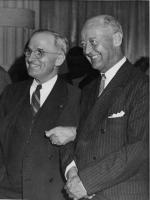Buchman spoke briefly. 'America is not without her problems in business, the home, in industry, in civic and in government life,' he said. 'We need a rededication of our people to the elementary virtues of honesty, unselfishness and love; and we must have the will again to find what unites people rather than what divides them . . . The future depends not only on what a few men may decide to do in Europe, but upon what a million men decide to be in America.'1
Harry Truman, by now a Senator, read out a message from President Roosevelt: 'The underlying strength of the world must consist in the moral fibre of her citizens. A programme of moral re-armament, to be most highly effective, must receive support on a world-wide scale.' All the Washington papers reported the meeting on the front page, the Post's headline declaring, 'First Anniversary Finds Moral Re-Armament World Force'.2

Next day Truman read an account of the meeting and messages from ten Parliaments into the Congressional Record, adding, 'It is rare in these days to find something which will unite men and nations on a plane above conflict of party, class and political philosophy.' As Buchman sat in the gallery of the Senate listening to Truman word was brought to him that the British Board of Trade had granted incorporation of his work under the name 'Oxford Group'. Elated by these two events, he was aware that he must keep his feet on the ground. 'When you have a day like this', he commented that evening, 'you have to live in the midst of the world and keep direction.'
Roosevelt had several old friends working with Buchman, but a more immediate reason for his interest perhaps lay in the recent action of one of his severest press critics. Moved by his contact with Moral Re-Armament, he had, over a private lunch in Roosevelt's study, apologised for the bitterness and bias of his writing. The apology was accepted. The writer remained an independent critic of the Administration but wrote more constructively, appreciating the President's many difficulties. Roosevelt, in his personal capacity, lent Moral Re-Armament discreet support. 'Though some at one time may have laughed at MRA,' he told Austin, 'today it commands great respect.'3
In the next weeks Buchman addressed the National Press Club in Washington; received his second honorary doctorate, this time of Laws from Oglethorpe University in Georgia; spoke with deep emotion at Bill Pickle's funeral in Pennsylvania; and held a week's training session for some hundreds at Stockbridge, Massachusetts. Then he travelled, via Detroit, Chicago and Minneapolis, to Los Angeles, where his third, most publicised blow was struck at a meeting in the Hollywood Bowl on 19 July.
285
Photo: Staunch supporters: Senator Harry S. Truman and Congressman Wadsworth (right).
©Arthur Strong/MRA Productions